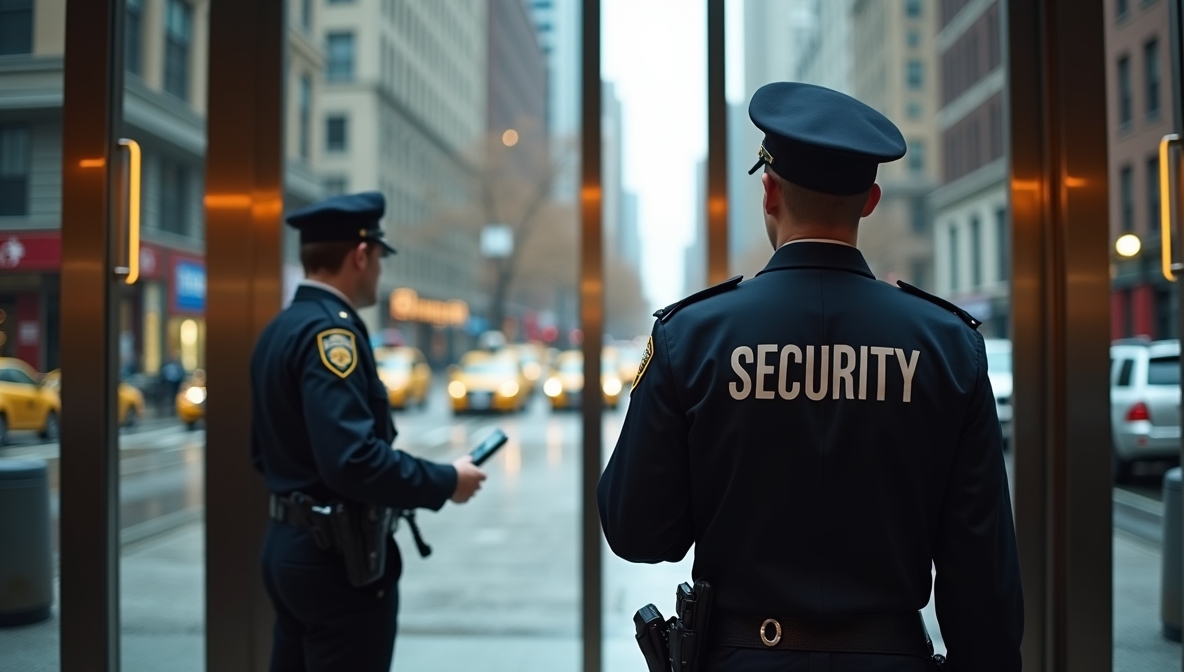New York security guard background checks involve comprehensive state-level screening through the Division of Criminal Justice Services, with additional NYC-specific requirements including enhanced criminal history reviews and character evaluations. The process typically takes 6-8 weeks and includes fingerprinting, criminal history analysis, and employment verification.
Key Takeaways
- State vs. NYC Requirements: New York State requires basic background screening, while NYC imposes additional licensing requirements through the Department of Consumer and Worker Protection.
- Processing Timeline: Standard security guard background checks take 4-6 weeks statewide, but NYC applications often extend to 8-10 weeks due to enhanced screening protocols.
- Criminal History Impact: Certain felony convictions create permanent disqualification, while misdemeanors may allow conditional approval after waiting periods.
- Armed Security Standards: Armed security positions require additional federal background checks, psychological evaluations, and weapons training certifications beyond basic guard requirements.
- Union Considerations: Unionized security positions in NYC may have different background check procedures and appeal processes through collective bargaining agreements.
- Cost Factors: Total background check and licensing fees range from $150-$400 depending on position type, location, and required certifications.
Understanding New York Security Guard Background Check Requirements
New York operates a dual-level security guard licensing system that creates distinct requirements for different jurisdictions. The New York State Division of Criminal Justice Services oversees statewide regulations. Meanwhile, New York City maintains additional local requirements through the Department of Consumer and Worker Protection. This layered approach means security professionals must navigate both state and local compliance standards.
The fundamental New York security guard background check process examines criminal history, employment verification, and character references. State law requires all security guards to complete fingerprint-based background screening through the New York State Police and FBI databases. Additionally, applicants must demonstrate good moral character and provide employment history covering the previous five years. The comprehensive screening process ensures only qualified individuals enter the security profession.
Furthermore, the background check system has evolved significantly in 2025 to include enhanced digital verification methods. Electronic employment verification now streamlines the process for applicants with documented work history. However, gaps in employment or incomplete documentation can still cause delays. Security professionals must prepare thorough documentation packages to avoid processing complications.
NYC vs. State Requirements Comparison
New York City security guard license requirements extend well beyond state minimums to include enhanced screening procedures. The city requires additional documentation, including proof of citizenship or legal residency, educational credentials, and detailed employment history. These heightened standards reflect the complex security environment in America's largest city. Moreover, the critical role security professionals play in public safety drives these stricter requirements.
| Requirement Category | New York State | New York City (Additional) |
| Background Check Timeline | 4-6 weeks | 8-10 weeks total |
| Criminal History Review | Standard FBI/State check | Enhanced local review |
| Training Hours Required | 8 hours pre-assignment | 16 hours minimum |
| License Renewal Period | 2 years | 2 years |
| Application Fees | $75-$150 | Additional $200-$250 |
The jurisdictional differences create important considerations for security professionals seeking employment across different areas. Understanding these variations helps applicants prepare appropriate documentation and budget adequate time for processing.
Criminal History and Disqualification Criteria
Automatic Disqualification Offenses
New York security guard background checks include specific criminal offenses that create permanent employment barriers. Felony convictions involving violence, theft, fraud, or weapons violations typically result in automatic disqualification from security positions. The state maintains a comprehensive list of disqualifying offenses that extends beyond traditional violent crimes. This list also includes financial fraud and drug trafficking convictions.
Sexual offenses and domestic violence convictions create additional barriers under both state and federal regulations. These restrictions align with federal requirements for security professionals who may work in sensitive locations. Furthermore, they apply to those who handle confidential information. Applicants with qualifying convictions cannot appeal these determinations through standard administrative processes.
Conditional Approval Scenarios
Certain misdemeanor convictions may allow conditional approval depending on the offense type, timing, and demonstrated rehabilitation. The New York State Division of Criminal Justice Services evaluates multiple factors during this assessment process. Character assessment considers the overall pattern of behavior rather than isolated incidents. Additionally, evidence of positive life changes weighs heavily in approval decisions.
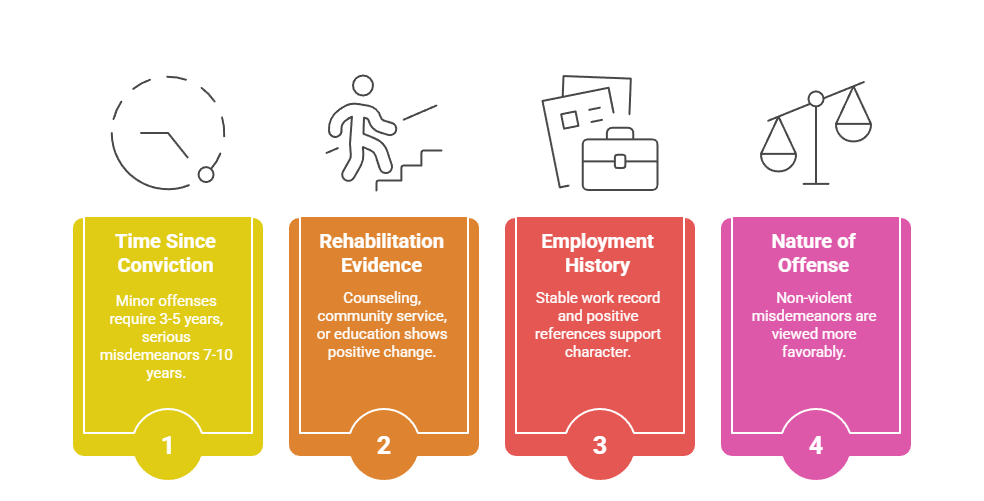
- Time Since Conviction: Generally requires 3-5 years for minor offenses, 7-10 years for serious misdemeanors
- Rehabilitation Evidence: Completion of counseling, community service, or educational programs demonstrates positive change
- Employment History: Stable work record and positive references support character assessment
- Nature of Offense: Non-violent misdemeanors receive more favorable consideration than those involving dishonesty or violence
The conditional approval process requires additional documentation and extends processing timelines by 2-4 weeks. Applicants must provide court documents, rehabilitation certificates, and character references supporting their suitability for security work.
New York Armed Security Background Check Process
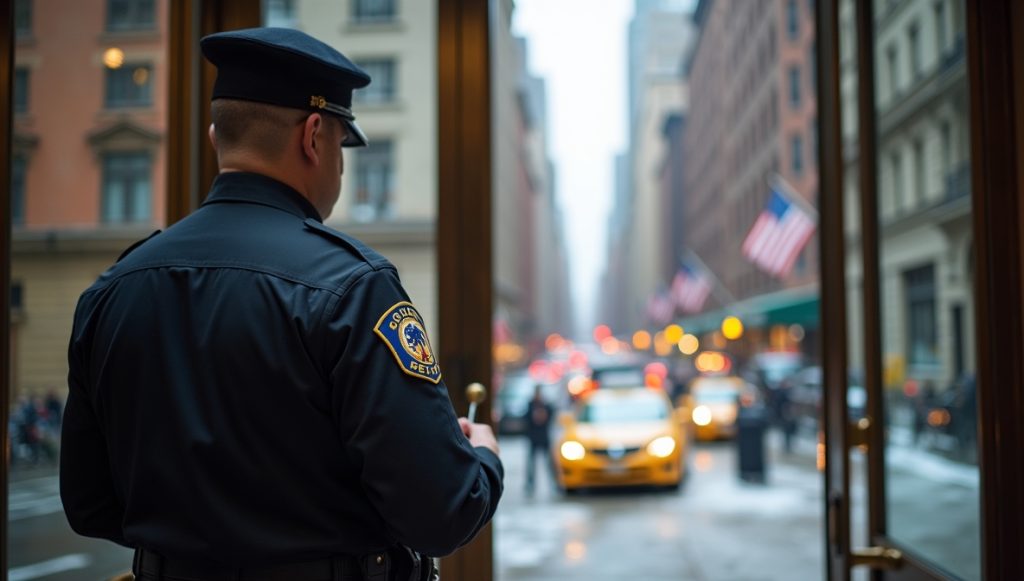
Armed security positions require enhanced screening that exceeds standard security guard requirements. The New York armed security background check involves federal firearms licensing procedures through the Bureau of Alcohol, Tobacco, Firearms and Explosives (ATF). This process includes psychological evaluation, advanced criminal history screening, and specialized training certification. Additionally, ongoing compliance monitoring ensures continued eligibility throughout employment.
Federal regulations prohibit armed security employment for individuals with domestic violence convictions, regardless of misdemeanor classification. This restriction, known as the Lautenberg Amendment, creates stricter standards than those applied to unarmed security positions. Moreover, armed security applicants must complete firearms proficiency training and maintain ongoing certification requirements. These standards have been updated in 2025 to include enhanced mental health screening protocols.
The enhanced screening process typically adds 4-6 weeks to standard background check timelines. Applicants must provide additional documentation including mental health records, military service history, and detailed personal references. The comprehensive nature of armed security screening reflects the significant responsibilities and potential risks associated with these positions. Therefore, candidates should begin this process well in advance of desired employment start dates.
Application Process and Required Documentation
Essential Documentation Checklist
The New York security guard background check application requires comprehensive documentation to support identity verification and character assessment. Primary documentation includes government-issued identification, Social Security verification, and proof of legal work authorization. Additional requirements vary based on position type and jurisdiction. Consequently, applicants should verify specific requirements before submitting applications.
Required documents include government-issued photo identification, detailed employment history covering five years, educational records, and character references. Criminal history documentation must include court records for any arrests or convictions regardless of disposition. The documentation requirements serve multiple purposes in the background screening process. Identity verification prevents fraudulent applications, while employment history helps establish patterns of reliability.
Fingerprinting and Biometric Requirements
All New York security guard applicants must complete live-scan fingerprinting at authorized locations throughout the state. The fingerprinting process captures biometric data for comparison against FBI and New York State criminal databases. Applicants must schedule appointments at certified fingerprinting facilities and pay associated processing fees. The 2025 system improvements have reduced wait times significantly at most facilities.
| Fingerprinting Requirement | Standard Process | Enhanced (Armed) |
| Number of Print Sets | 2 | 3 |
| Processing Time | 30-45 minutes | 60-90 minutes |
| Retry Fee (if needed) | $25 | $35 |
Poor print quality or missing impressions require repeat sessions, potentially delaying the overall application timeline. Applicants with physical conditions affecting fingerprint quality may require alternative identification procedures.
Processing Timelines and Expedited Options
Standard New York security guard background check processing follows established timelines that vary based on application complexity and seasonal volume. State-level processing typically requires 4-6 weeks, while NYC applications extend to 8-10 weeks due to enhanced review procedures. Understanding these timelines helps applicants plan employment transitions and avoid gaps in income. Moreover, proper planning prevents disappointment when job opportunities arise suddenly.
Several factors influence processing speed beyond standard review procedures. Applications with criminal history require additional investigation time, typically adding 2-4 weeks to standard timelines. Similarly, applicants with extensive employment history or military service may experience longer review periods. Investigators must verify information across multiple sources, which takes considerable time. Therefore, complete and accurate initial submissions help minimize delays.
Limited expedited processing options exist for certain circumstances, though these remain restricted to specific situations. Emergency security staffing needs or seasonal employment demands rarely qualify for expedited review. However, 2025 policy updates allow expedited processing for military veterans and first responders transitioning to security careers. Applicants should plan accordingly and avoid situations requiring rushed background check completion. Instead, beginning the process early provides the best outcomes for all parties involved.
Union Considerations and Special Circumstances
Unionized security positions in New York often include additional background check considerations and support services. Major security unions like SEIU 32BJ and the Security, Police, and Fire Professionals of America (SPFPA) provide members with application assistance. These organizations also offer legal support during the background screening process. Such services can prove valuable for applicants with complex criminal histories or documentation challenges.
Union membership may also influence background check standards and appeal processes. Collective bargaining agreements sometimes include specific procedures for handling background check disputes. Additionally, they may provide frameworks for conditional approvals. Union-sponsored training programs may satisfy certain licensing requirements or provide preference during the application review process. Security professionals should investigate union membership benefits before beginning the background check process.
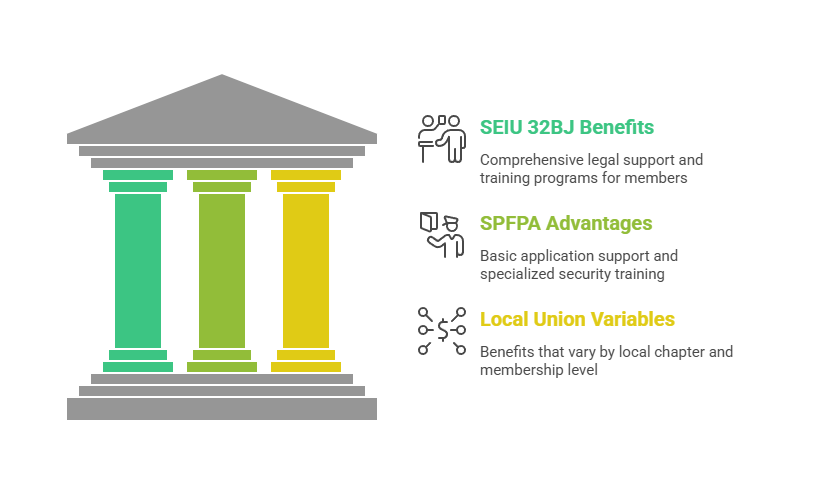
- SEIU 32BJ Benefits: Comprehensive legal support, application guidance, extensive training programs
- SPFPA Advantages: Basic application support, limited legal assistance, specialized security training
- Local Union Variables: Benefits vary significantly by local chapter and membership level
Union representatives can provide valuable insights into the background check process. They also offer support during appeals or conditional approval situations.
Costs and Fees Breakdown
The total cost of New York security guard background check and licensing varies significantly based on position type and jurisdiction. State-level fees typically range from $75-$150, while NYC requirements add $200-$250 in additional costs. These fees cover background screening, fingerprinting, training, and initial licensing expenses. However, hidden costs often surprise first-time applicants who haven't budgeted comprehensively.
Additional costs may include fingerprinting services at $25-$50, required training programs at $100-$300, and medical examinations for armed positions at $75-$150. Transportation costs for testing and appointments can add significantly to the total expense. Furthermore, legal documentation fees for court records or certified copies range from $50-$200. Time off work for appointments and testing represents another financial consideration for many applicants.
Financial assistance programs exist through some unions, workforce development agencies, and community organizations. These programs may cover partial costs for qualifying applicants, particularly those transitioning from other industries. Military veterans and first responders often qualify for reduced fees through special programs. Prospective security guards should investigate available assistance before beginning the application process. Additionally, some employers offer reimbursement programs for successful candidates.
Maintaining Compliance and Renewal Requirements
Biennial Renewal Process
New York security guard licenses require renewal every two years, with background check updates as part of the renewal process. The renewal background screening is typically less extensive than initial applications but still includes criminal history updates. Employment verification remains a key component of renewal applications. Security professionals must maintain clean records and report any arrests or convictions to licensing authorities promptly.
Ongoing compliance requirements include continuing education, updated training certifications, and notification of address or employment changes. Failure to maintain compliance can result in license suspension or revocation. This effectively ends security career opportunities in New York. Professional security guards should establish systems for tracking renewal deadlines and maintaining required documentation.
Career Advancement Opportunities
The renewal process provides opportunities for career advancement through additional certifications and specialized training. Many security professionals use renewal periods to pursue armed security licensing or supervisory certifications. Specialized skills training in areas like cybersecurity or emergency response can significantly increase earning potential. This approach helps maintain competitiveness in the evolving security industry while ensuring continued compliance.
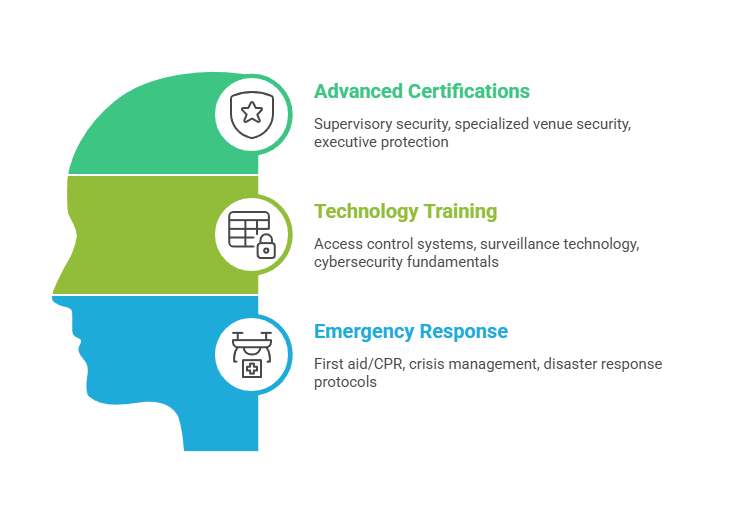
- Advanced Certifications: Supervisory security, specialized venue security, executive protection
- Technology Training: Access control systems, surveillance technology, cybersecurity fundamentals
- Emergency Response: First aid/CPR, crisis management, disaster response protocols
Career development during renewal periods demonstrates commitment to professional growth. It also positions security professionals for promotion opportunities and higher compensation levels.
Industry Changes and 2025 Updates
The security industry has experienced significant changes in 2025, particularly regarding background check procedures and technology integration. Digital verification systems now streamline many aspects of the application process. Electronic employment verification reduces processing time for applicants with complete documentation. However, these systems require accurate information input to function effectively.
Enhanced mental health screening protocols for armed security positions reflect growing awareness of workplace violence prevention. These protocols include more comprehensive psychological evaluations and ongoing monitoring requirements. Additionally, cybersecurity background checks have been introduced for security professionals working in technology-sensitive environments. The evolving threat landscape drives these additional screening requirements.
New federal guidelines also impact state-level background check procedures in 2025. Enhanced coordination between state and federal databases improves accuracy and reduces processing delays. Furthermore, streamlined processes for military veterans and law enforcement personnel reflect recognition of their prior screening and training. These improvements benefit both applicants and employers by reducing administrative burden while maintaining security standards.
Common Application Mistakes to Avoid
Many applicants inadvertently delay their background check process through common documentation errors. Incomplete employment histories represent the most frequent mistake, particularly for applicants with irregular work patterns. Missing dates, incorrect employer information, or unexplained gaps require additional investigation time. Therefore, thorough preparation and accurate information submission prevent unnecessary delays.
Address history discrepancies also cause processing complications, especially for applicants who have moved frequently. Utility bills, lease agreements, and other documentation help verify residence history. Additionally, character reference contact information must be current and accurate for efficient verification. References should be notified in advance about potential contact from investigators.
Criminal history disclosure remains a critical area where mistakes occur frequently. Applicants must disclose all arrests and convictions, regardless of disposition or expungement status. Failing to disclose known criminal history often results in automatic disqualification. Conversely, complete disclosure with proper explanation and documentation may allow conditional approval. Honesty throughout the application process serves applicants' best interests in the long term.
Conclusion
New York security guard background checks represent a comprehensive screening process designed to ensure public safety and professional standards in the security industry. The dual-level requirements between state and NYC jurisdictions create complexity that requires careful planning and preparation. Understanding criminal history implications, documentation requirements, and processing timelines helps applicants navigate the system successfully. Whether pursuing unarmed or armed security positions, thorough preparation and realistic timeline expectations contribute to successful background check completion and career advancement in New York's dynamic security sector.
Frequently Asked Questions
How long does a New York security guard background check take?
Standard New York State security guard background checks typically take 4-6 weeks to complete. However, NYC applications often require 8-10 weeks due to additional local requirements and enhanced screening procedures. Applications with criminal history or complex employment backgrounds may take additional time.
What criminal convictions disqualify you from security work in New York?
Felony convictions involving violence, theft, fraud, weapons violations, sexual offenses, and domestic violence typically result in automatic disqualification. Some misdemeanor convictions may allow conditional approval after waiting periods of 3-10 years, depending on the offense type and rehabilitation evidence.
Do NYC security guards need different licenses than New York State guards?
Yes, NYC security guards must meet both New York State requirements and additional NYC-specific licensing through the Department of Consumer and Worker Protection. This includes enhanced background screening, additional training hours, and higher fees totaling $200-$250 beyond state requirements.
What's required for an armed security guard background check in New York?
Armed security positions require federal firearms licensing through the ATF, psychological evaluation, enhanced criminal history screening, firearms training certification, and additional documentation including mental health records and military service history. The process adds 4-6 weeks to standard timelines.
How much does a New York security guard background check cost?
Total costs range from $150-$400 depending on position type and location. State-level fees are typically $75-$150, with NYC adding $200-$250. Additional costs include fingerprinting ($25-$50), training programs ($100-$300), and potential medical examinations for armed positions.
Can you appeal a denied security guard background check in New York?
Appeals are possible for certain types of denials, particularly those involving conditional approval scenarios or documentation issues. However, automatic disqualification offenses like violent felonies cannot typically be appealed. Union members may receive legal support during the appeal process.
Additional Resources
- New York State Division of Criminal Justice Services - Security Guard Licensing
https://www.criminaljustice.ny.gov/ops/sgcb/ - NYC Department of Consumer and Worker Protection - Security Guard Requirements
https://www.nyc.gov/site/dca/businesses/license-checklist-security-guard.page - New York State Police - Background Check Services
https://www.troopers.ny.gov/Criminal_History/ - SEIU 32BJ - Security Guard Union Support Services
https://www.32bj.org/ - Bureau of Alcohol, Tobacco, Firearms and Explosives - Armed Security Licensing
https://www.atf.gov/rules-and-regulations - New York State Department of Labor - Security Industry Career Information
https://www.labor.ny.gov/
Still have questions?
Get in touch with our team today for a personalized demo and discover how our tailored volume pricing and packages can drive results for your business!
How useful was this page?*
Note: your comments are anonymous. We use them to improve the website. Do not include any personal details.
Visit our FCRA Compliance Tool or leave a message here if you need a response.
From the blog Explore the GCheck Content Hub

Healthcare Background Screening Costs: 2026 Budget Planning Guide for Medical Facilities
30 Dec, 2025 • 23 min read
FACIS Background Check: 2026 Healthcare Compliance Guide
18 Dec, 2025 • 20 min read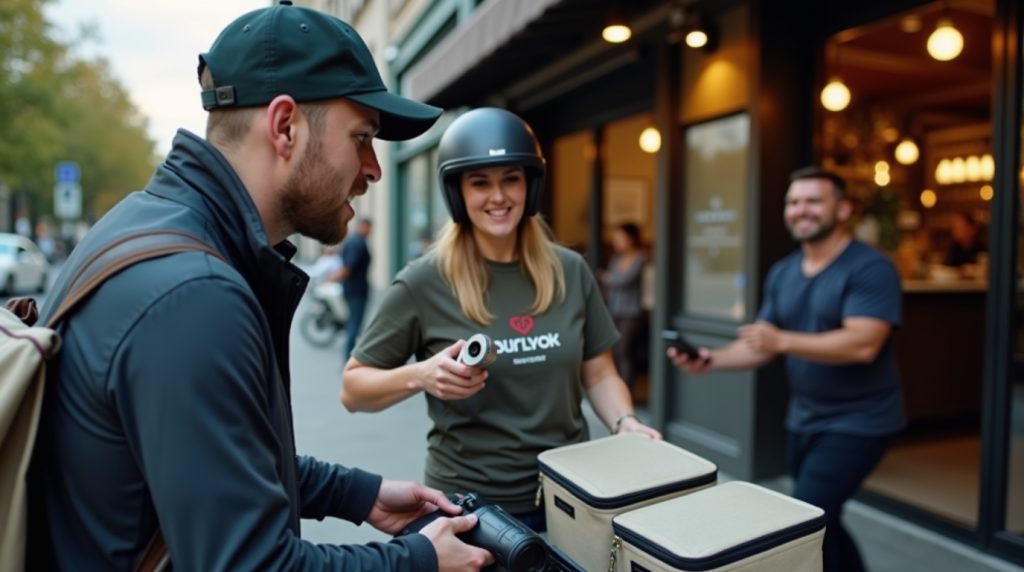
Food Delivery Driver Background Check: Complete Compliance Guide for Restaurant Operators
17 Dec, 2025 • 17 min readThe information provided in this article is for general informational and educational purposes only and should not be construed as legal advice or a substitute for consultation with qualified legal counsel. While we strive to ensure accuracy, employment screening laws and regulations—including but not limited to the Fair Credit Reporting Act (FCRA), Equal Employment Opportunity Commission (EEOC) guidelines, state and local ban-the-box laws, industry-specific requirements, and other applicable federal, state, and local statutes—are subject to frequent changes, varying interpretations, and jurisdiction-specific applications that may affect their implementation in your organization. Employers and screening decision-makers are solely responsible for ensuring their background check policies, procedures, and practices comply with all applicable laws and regulations relevant to their specific industry, location, and circumstances. We strongly recommend consulting with qualified employment law attorneys and compliance professionals before making hiring, tenant screening, or other decisions based on background check information.
